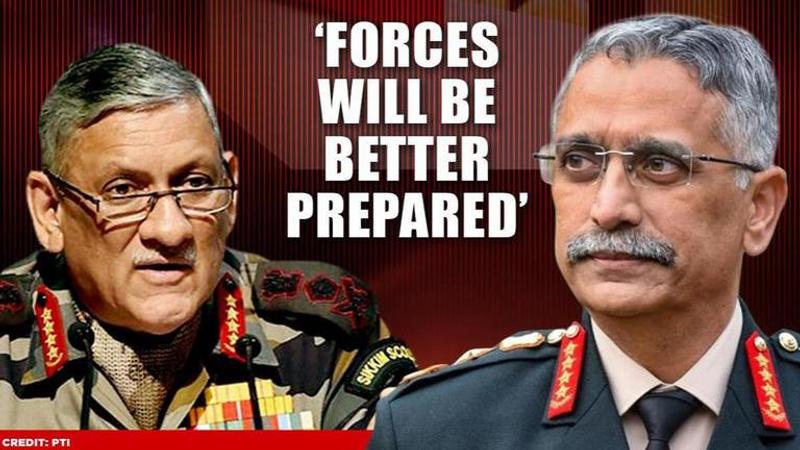Published 09:13 IST, February 14th 2020
'With creation of CDS & DMA, synergy among three services will get fillip': Army Chief
Army Chief Gen Naravane on Thursday said with the office of the CDS and the DMA coming into being, the "synergy" among the three services will "get a fillip".

Chief of Army Staff General MM Naravane on Thursday expressed confidence that with the creation of Department of Military Affairs, which is headed by Chief of Defence Staff (CDS), the "synergy" between three services will "get a fillip" and India will be much better prepared for "whatever we have to do in future."
Speaking at a book launch event in New Delhi, the Army chief pointed out that the synergy demonstrated by three services during the 1971 war, when India won a decisive victory over Pakistan, was achieved due to personal rapport shared between the three chiefs.
'A perfect example of what synergy can achieve'
"It was a perfect example of what synergy can achieve, what jointmanship can achieve in making sure that the aims and objectives are accomplished in the least possible time and the least possible effort. That is the acme of military skill. But this was achieved largely due to personal rapport shared between three chiefs and synergy and tri-service integration is not a matter of chance and it is not a matter to be left purely to inter-personal relationships and rapport. It is something which needs to be institutionalised," he said referring to the Indian Military campaign in 1971 war.
Speaking about the creation of post of Chief of Defence Staff, he said, "With the office of Chief of Defence Staff (CDS) and Department of Military Affairs coming into being, I am sure that the synergy between three services will definitely get a fillip and we will be much better prepared for whatever we have to do in future."
'It should change the political landscape'
The Army Chief stressed that for a battle or campaign to be called decisive, it must have far-reaching implications. Referring to the third battle of Panipat and the Battle of Plassey, the Army Chief said, "For a campaign to be called decisive, there have to be far-reaching consequences. It should change the political landscape. It should change the map. And if we see it in that light, then the 1971 war and the liberation of Bangladesh was indeed a turning point and indeed a very decisive campaign."
"It was executed by all three services. We liberated Bangladesh in a matter of just about two weeks. A new country was born. 75 million people got freedom. That is the kind of change this campaign (1971 war) brought about and something which we can definitely be proud of. It was an unprecedented military feat not seen since the Second World War," he added.
In the 1971 India-Pakistan war, Indian Army led by then Army Chief, General Sam Manekshaw (later Field Marshal) in a swift campaign, ably assisted by Indian Air Force and Navy liberated East Pakistan which later came to be known as Bangladesh.
General Naravane was speaking at the release of the book - 71 Dash to Decca - authored by GD Bakshi. "As Gen Bakshi has brought out, it was our finest hour. There was an immense amount of coordination between three services," he said.
The 1971 war ended with Pakistani Forces in the Eastern Wing led by Lt Gen AAK Niazi surrendering to then GOC-in-C of Eastern Command of Indian Army, Lt Gen JS Aurora.
The government earlier had created a Department of Military Affairs in the Defence Ministry to be headed by newly-appointed Chief of Defence Staff General Bipin Rawat. General Rawat, who completed a three-year tenure as Army Chief, was named as the country's first CDS in December.
(With agency inputs)
Updated 09:13 IST, February 14th 2020




